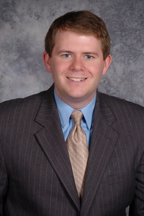Wabash's Seamus Boyce ’03 doesn't have enough legal experience to argue a case before the Supreme Court of the United States. But, being a few months shy of the three years of experience required, didn't prevent Boyce from writing the briefs that were argued by the Court on Tuesday.
The case involves the legality of a strip search of a middle school student. Boyce's work centered on writing the briefs for the National School Board Association to protect the school administrators who ordered the search.
Read the New York Timesarticle about the case, which was argued Tuesday.
The Wabash Class Agents for the Class of 2003 recently interviewed Boyce about the case. Here's what they sent us:
 Seamus Boyce, ’03, currently with the law firm of Church, Church, Hittle & Antrim in Noblesville, Indiana, has a case that will soon be heard by the United States Supreme Court. While making it to the Supreme Court is impressive enough as it is, the feat is even more impressive when you consider that the Court is asked to review over 10,000 cases per Term and only agrees to hear between 150 and 160 of them, with oral argument in only between 80 and 90 cases.
Seamus Boyce, ’03, currently with the law firm of Church, Church, Hittle & Antrim in Noblesville, Indiana, has a case that will soon be heard by the United States Supreme Court. While making it to the Supreme Court is impressive enough as it is, the feat is even more impressive when you consider that the Court is asked to review over 10,000 cases per Term and only agrees to hear between 150 and 160 of them, with oral argument in only between 80 and 90 cases.
Your Class Agents caught up with Seamus to ask him a few questions about the case.
Q: Seamus, congrats on getting the Supreme Court to take your case! Tell us a little about what the case involves.
A: It is a public school student search case. An appeal from a Ninth Circuit Court of Appeals decision where the court ruled that a strip search of a junior high student down to her underwear was unreasonable where the objective of the search was prescription drugs without a prescription. Further, the court ruled that the search was so unreasonable that the assistant principal who ordered the search could be sued for his personal assets.
Q: How is it that you got involved in the case?
A: I was asked by the National School Board Association (NSBA) to draft its amicus curiae or "friend of the court" brief to convince the Supreme Court to take the case. Once the Supreme Court accepted review of the case, the NSBA asked me to draft its amicus brief for the final stage or merits stage of the argument.
Q: What did you think the odds were that the Supreme Court would agree to take your case?
A: The odds are never good that the Supreme Court will take any case. Most attorneys don't ever get a case to the Supreme Court. Therefore, I did not have high expectations. That said, the facts of the case were fairly appealing for a review. Even if someone disagrees with the assistant principal in this case regarding the reasonableness of strip searches in public schools, it was a stretch to allow parents to get money damages from the assistant principal personally.
Q: While we’re sure you could, we assume that you won’t be arguing before the Supreme Court. Is that right? What is your role in the case?
A: There are several attorneys involved in the case. There is a firm out of Arizona that represents the school district. Then there is the American Civil Liberties Union (ACLU) that represents the parents and the student. My firm represents two organizations that are third parties to the case: (1) the NSBA; and (2) the Association of American School Administrators (AASA). I could orally argue the case but for my age. Unfortunately, I am several months short of the required three years of experience required to orally argue before the Supreme Court. My arguments will be limited to the written brief submitted to the Court. It is likely that one attorney for the school district and one attorney for the ACLU will do the oral arguments and perhaps a representative from the US Solicitor General's office.
Q: What from your Wabash experience do you find most helpful as you got ready for argument?
A: There is a lot of discussion and research involved, but the real skill in Supreme Court argument is brief writing. Just like law school and law practice generally, I attribute most of my skills for brief writing to my experiences at Wabash.